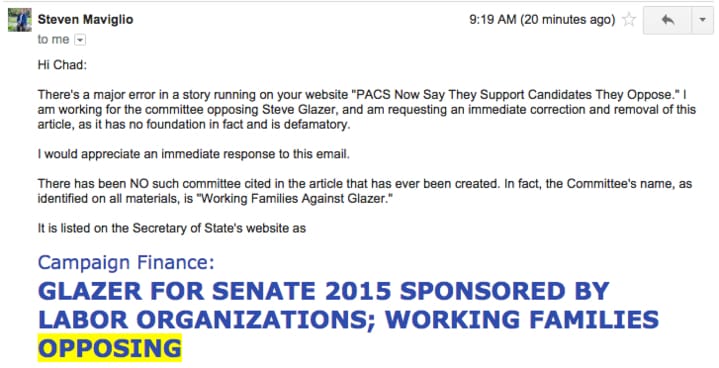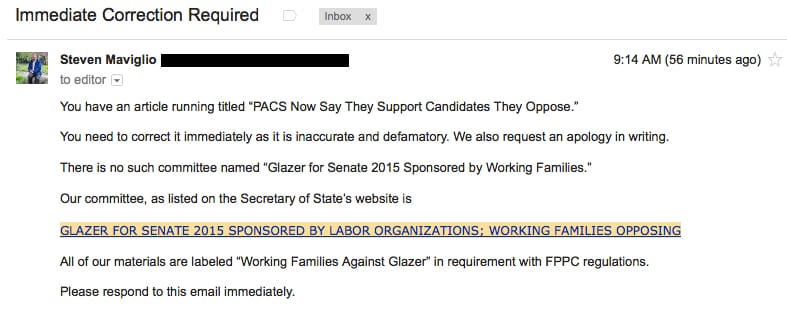Are PACs Trying to Keep Voters from Participating in Calif. Senate District 7?

Update: Information provided to IVN suggests that there was confusion in the name of the PAC based on how it appears on the secretary of state's website, which alphabetizes names so that the candidate's name appears first. The article has been updated and corrected.
Editor's note: The initial published version of this article said the name of the PAC was Glazer For Senate 2015 Sponsored By Labor Organizations; Working Families. The name is Glazer For Senate 2015 Sponsored By Labor Organizations; Working Families Opposing. The article has been updated to reflect this correction. A consultant for the PAC brought the following concern to our attention:

The consultant also sent an email to the author:

Political action committees are known for using names that are often esoteric and forgettable. As
previously reported on IVN, PAC names are based on generic ideas that conform to a specific theme. The goal of a PAC's name in not necessarily to deceive, but to spread a desired message without establishing brand recognition.
It is not uncommon for a PAC to send out arguably deceptive mailers or release vicious attack ads. Voters in California Senate District 7 have seen plenty of this, but there are several odd things popping up in the special election for the district.
Working Families Opposing Glazer For Senate 2015 Sponsored By Labor Organizations has raised over $1.8 million in what is likely going to be one of the most expensive special elections for State Senate in California's history.
Kind of a mouth full, isn't it? Because of how the secretary of state alphabetizes PAC names to list the name of the candidate first, the PAC appears as "Glazer For Senate 2015 Sponsored By Labor Organizations; Working Families Opposing," on financial reports, which can be confusing for anyone who is not familiar with the secretary of state's website. It begs the question as to why a PAC opposing Steve Glazer would put "Glazer for Senate 2015" in its name at all.
Democrats Steve Glazer and Assemblymember Susan Bonilla advanced to the general election in district 7 as a result of California’s nonpartisan, top-two primary. Glazer placed first in the primary with 33 percent of the vote, while Bonilla, who is backed by the Democratic Party, placed second with 24.9 percent.The primary was marred with controversy after another PAC, the Asian American Small Business PAC, sent mailers out supporting Republican
Michaela Hertle weeks after she dropped out of the race and endorsed Glazer.
The Sacramento Bee reported that Glazer believed it was an attempt to keep him from placing in one of the top two spots in the primary. The California Republican Party filed a trademark lawsuit against the PAC for using Republican images in the mailers.
There are quite a few instances of unusual PAC behavior going on in this hotly contested race — much of which has specifically targeted Glazer and is supported by “Big Labor.” Glazer hasn’t garnered much support from labor groups since he opposed the BART strikes in 2014.
However, some attempts to deceive voters may not escape scrutiny from the California Fair Political Practices Commission (FPPC), a state agency charged with investigating alleged violations of the Political Reform Act of 1974. (Think of it as the state equivalent of the FEC.) There is certainly some dirty politics going on in district 7, some of which could be categorized as fraudulently misleading.
The winner of the special election in Senate District 7 will not be decided by Democrats as it would have under the old semi-closed primary system since registered Democrats overwhelmingly outnumber any other voting bloc in the district. The election will be decided by voters outside the party, which means the winner will be the one who can more broadly appeal to Democrats, Republicans, and independents.
Many Republicans and voters outside the Democratic Party have gotten behind Glazer. Therefore, the logical strategy for any PAC that opposes a candidate with broader appeal than their own is to dissuade voters outside the Democratic Party from participating altogether. Negative attack ads and dirty politics can disgust voters to the point of staying home on election day; especially, independent voters.
Whether or not this strategy works remains to be seen. The special election for Senate District 7 will take place on May 19, 2015.



